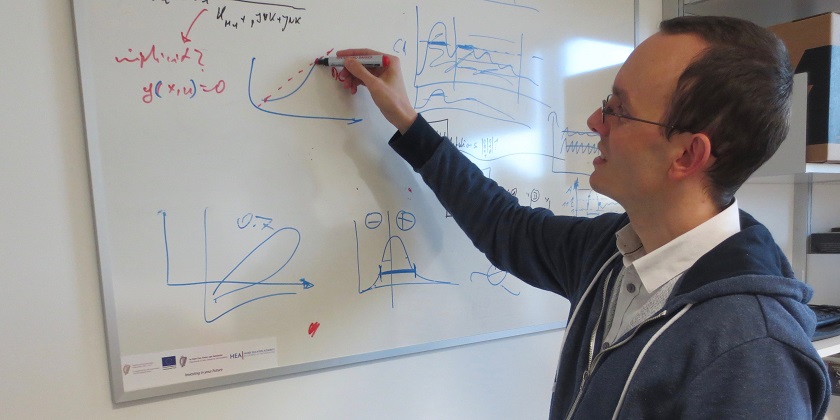Fellowship and Funding: Dirk Fey

SBI Group Leader Dr. Dirk Fey was recently named an Ad Astra fellow and was also separately awarded funding from the European Commission Horizon 2020 Initiative. He discusses both in the following Q & A.
1. What is your hometown?
Heidelberg, Germany.
2. How many years have you been with SBI, and what have your different roles been?
After a rather mathematical PhD on biology-inspired topics in systems theory (University of Liege, Belgium), I joined Prof Boris Kholodenko’s group in Systems Biology Ireland. The idea for my postdoc was to apply my mathematics background to real-world problems arising in biology and medicine. SBI has been the ideal environment to learn a lot about biology very quickly, and in 2015 we published a nice proof-of-principle paper that mathematical models of cancer signalling can be used to predict the survival probabilities of cancer patients. Following this, I was fortunate enough to be offered a Research Fellow position, which allowed me establish the SBI Cancer Dynamics and Modelling group. In parallel, I also developed a lecture course on Systems Biology through which I teach mathematical modelling to our postgraduate students.
3. You have just been awarded nearly €250,000 in funding from the European Commission Horizon 2020 initiative after receiving 14 out of 15 marks - what kinds of research will this grant enable you to do and what do you hope to achieve?
Yes, I am very excited about this. The project is part of a 5 Mio EUR consortium that involves many partners throughout Europe called CLARIFY: Cancer Long Survivor Artificial Intelligence Follow-up. Because of advances in treatments, many cancer patients now survive (2/3 of patients live for five years or longer) but sometimes often suffer from long-term or late side effects. Our aim is to identify those post-treatment cancer survivors who do have ongoing health problems and determine the factors that predict this poor health status. To do this, we want to merge the mathematical models of cancers that we are developing in my group with data from thousands of patients using artificial intelligence. The ambition is to model the genetic factors that link the genetic profile of a tumour to the patient’s risk and understand the processes that may deteriorate a patient’s condition after treatment. The challenge here is to interpret the genome, for which we use mathematical models of how genes make proteins, how these proteins interact, and how these network interactions determine what cells do. Hopefully, this research will help to implement a “risk stratified care” and design a patient-specific follow-up and supportive care protocol that can prevent the secondary effects and toxicities that affect the patients’ wellbeing and quality of life.
4. You have also just been named an Ad Astra fellow - for those who may not know, what does this mean and how will it change your career?
With the Ad Astra fellowship programme, UCD is looking for the best and brightest talent from around. Becoming an Ad Astra fellow means that I will join the UCD School of Medicine as Assistant Professor and also receive research funding to support a PhD student. This gives me the opportunity and pursue my vision for teaching and research in the School of Medicine. I am particularly passionate about developing mathematical models for precision medicine in my research and integrating mathematics education into the school’s programmes. The current trend in medicine is that it will become more and more systems and algorithm based in the future. To facilitate this shift towards precision systems medicine, universities need to provide the corresponding mathematical education, and I am very happy that I can go on this exciting journey with UCD.
For More Information:
Fey Group
Cancer Dynamics and Modelling, http://www.ucd.ie/sbi/people/groups/feygroup/
Ad Astra Fellowships
http://www.ucd.ie/adastrafellows/
Horizon 2020
https://ec.europa.eu/programmes/horizon2020/en/what-horizon-2020
